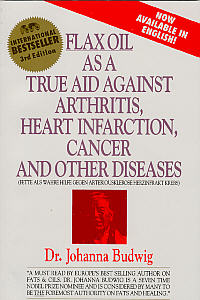 he
notion that the West is killing itself with artificial trans-fatty
acids and other saturated fats, while steadily decreasing its intake
of natural, unadulterated, electron-rich essential fatty acids
(ETA's), is hardly new. In fact, one of the leading books
distributed at health food shows by vendors of flax products
is the book you see in the right column. at the right. he
notion that the West is killing itself with artificial trans-fatty
acids and other saturated fats, while steadily decreasing its intake
of natural, unadulterated, electron-rich essential fatty acids
(ETA's), is hardly new. In fact, one of the leading books
distributed at health food shows by vendors of flax products
is the book you see in the right column. at the right.
 Dr. Johanna Budwig (1906 - present)
still stands today as one of the leading authorities on edible
fats and healing, but the majority of her book is taken
from a speech she gave in Xurich in November, 1959.
Most of the crucial work revealing the relationship between
"healthy" and "unhealthy" fats was conducted in the late '40's
and early '50's. Dr. Johanna Budwig (1906 - present)
still stands today as one of the leading authorities on edible
fats and healing, but the majority of her book is taken
from a speech she gave in Xurich in November, 1959.
Most of the crucial work revealing the relationship between
"healthy" and "unhealthy" fats was conducted in the late '40's
and early '50's.
 In a nutshell, here is the argument:
there are twenty (20) different types of fatty acids that the human body
needs for optimum health. It can manufacture all but two (2) of these
twenty. These two must be obtained from the diet and are known as the
Essential Fatty Acids (EFA's): Omega-6 Linoleic Acid (LA) and Omega-3
Linolenic Acid (LNA). The EFA's combine to make
two of the four major
families of unsaturated fatty acids. Instead of choosing foods
that contain these essential fats, consumers have chosen, over the course
of the last century, to pick products with saturated fats which not
only fail to provide the essentials, but prevent the human body from
properly metabolizing fats... hence, the rise in the degenerative
diseases associated with this loss in metabolic function. In a nutshell, here is the argument:
there are twenty (20) different types of fatty acids that the human body
needs for optimum health. It can manufacture all but two (2) of these
twenty. These two must be obtained from the diet and are known as the
Essential Fatty Acids (EFA's): Omega-6 Linoleic Acid (LA) and Omega-3
Linolenic Acid (LNA). The EFA's combine to make
two of the four major
families of unsaturated fatty acids. Instead of choosing foods
that contain these essential fats, consumers have chosen, over the course
of the last century, to pick products with saturated fats which not
only fail to provide the essentials, but prevent the human body from
properly metabolizing fats... hence, the rise in the degenerative
diseases associated with this loss in metabolic function.
 Considering the evidence at hand,
why aren't more people listening? Considering the evidence at hand,
why aren't more people listening?
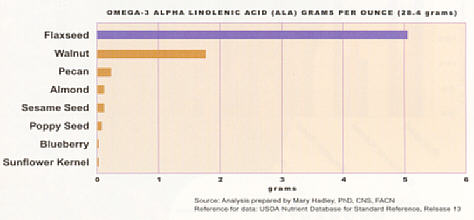 The Clear Winner in Omega-3 Fatty Acids
The Clear Winner in Omega-3 Fatty Acids
 Omega-3 Alpha Linolenic Acid goes well beyond
its identification as an Essential Fatty Acid (EFA). Studies confirm its
ability to reduce LDL cholesterol and triglyerides, which are proven risk
factors in coronary heart disease. Omega-3 Alpha Linolenic Acid goes well beyond
its identification as an Essential Fatty Acid (EFA). Studies confirm its
ability to reduce LDL cholesterol and triglyerides, which are proven risk
factors in coronary heart disease.
 In the U.S., the FDA has not yet
determined a Reference Daily Intake (RDI) for Omega-3 fatty acids. However,
a joint committee of the World Health Organization and Food & Agriculture
Organization recommends an Omega-6/Omega-3 dietary ratio between 5:1
and 10:1. The typical North American diet ranges from 10:1 to 25:1.
Flaxseed provides a ratio of 0.3:1. By comparison, the ratio for corn
oil is 45:1, for soybean oil 10:1, and for canola oil 3:1.
[ Enlarge chart ] In the U.S., the FDA has not yet
determined a Reference Daily Intake (RDI) for Omega-3 fatty acids. However,
a joint committee of the World Health Organization and Food & Agriculture
Organization recommends an Omega-6/Omega-3 dietary ratio between 5:1
and 10:1. The typical North American diet ranges from 10:1 to 25:1.
Flaxseed provides a ratio of 0.3:1. By comparison, the ratio for corn
oil is 45:1, for soybean oil 10:1, and for canola oil 3:1.
[ Enlarge chart ]
|
 Dr. Budwig doesn't leave the obvious
unanswered. She has repeatedly pointed to economic factors that prevent
people from understanding the importance of choosing natural, unsaturated
fats - particularly those high in Omega-6 and Omega-3 oils, over the
artificial varieties to which the 20th century gave birth. ("The instigators
are a number of die-hard dictators in the medical institutes.") Dr. Budwig doesn't leave the obvious
unanswered. She has repeatedly pointed to economic factors that prevent
people from understanding the importance of choosing natural, unsaturated
fats - particularly those high in Omega-6 and Omega-3 oils, over the
artificial varieties to which the 20th century gave birth. ("The instigators
are a number of die-hard dictators in the medical institutes.")
 She, and
the researchers who have come behind her, distill volumes of scientific
documentation to point to the harm done by margarine and other
hydrogenated fats and oils. Her position on animal fats is reflected
in her own self-professed vegetarianism. She, and
the researchers who have come behind her, distill volumes of scientific
documentation to point to the harm done by margarine and other
hydrogenated fats and oils. Her position on animal fats is reflected
in her own self-professed vegetarianism.
 In addition to her research dating
back to the '40's, Dr. Budwig, as a clinician, cured thousands of cases of cancer
and heart disease over the course of her career. If you could distill her
advice in just one sentence: "Eat the right fats. Avoid the bad ones.
And if at all available, take flax oil daily." And why flax?
Because it has a
higher percentage of EFA's than any other edible fat and in the
best ratios. In addition to her research dating
back to the '40's, Dr. Budwig, as a clinician, cured thousands of cases of cancer
and heart disease over the course of her career. If you could distill her
advice in just one sentence: "Eat the right fats. Avoid the bad ones.
And if at all available, take flax oil daily." And why flax?
Because it has a
higher percentage of EFA's than any other edible fat and in the
best ratios.
Flaxseed versus Flax Oil
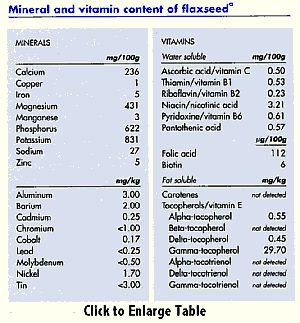
 Most health food stores sell flax oil.
The most prominent name in the U.S. and Canada is Barlean's Organic Flax Oil.
We shy away from recommending flax oil (though we could easily carry it),
because flax has many other important nutrients besides the fat (41%).
It has a healthy helping of dietary fiber (28%), an
amino acid pattern
similar to soy (21%), ash (4%), and carbohydrates (6%) -- the last of
which includes phenolic acids, lignins, and hemicellulose -- not to
mention important vitamins and minerals (see table). Why
throw all that nutrition away? (Note: Barlean's and other vendors
now extract some of the crucial lignans as well as sell a
"High Lignan Flaxseed Oil" - but, again, why not take the full
nutrition of the whole food?) Most health food stores sell flax oil.
The most prominent name in the U.S. and Canada is Barlean's Organic Flax Oil.
We shy away from recommending flax oil (though we could easily carry it),
because flax has many other important nutrients besides the fat (41%).
It has a healthy helping of dietary fiber (28%), an
amino acid pattern
similar to soy (21%), ash (4%), and carbohydrates (6%) -- the last of
which includes phenolic acids, lignins, and hemicellulose -- not to
mention important vitamins and minerals (see table). Why
throw all that nutrition away? (Note: Barlean's and other vendors
now extract some of the crucial lignans as well as sell a
"High Lignan Flaxseed Oil" - but, again, why not take the full
nutrition of the whole food?)
 Although certain studies assure us
that fat oxidation is minimal from the time the flax
is processed and put into bottle to the time we use it as consumers,
why take any chances? -particularly when it is so much less expensive to buy
the raw flaxseed? (As a general scientific priniciple, all consumers should
know that once you break the hull of a grain seed, you initiate an
acceleration of the oxidation (rancidity) of whatever oils are in
that seed. If you buy or keep a grain seed, you should, ideally,
wait to break the hull at or near the time of its consumption.) Although certain studies assure us
that fat oxidation is minimal from the time the flax
is processed and put into bottle to the time we use it as consumers,
why take any chances? -particularly when it is so much less expensive to buy
the raw flaxseed? (As a general scientific priniciple, all consumers should
know that once you break the hull of a grain seed, you initiate an
acceleration of the oxidation (rancidity) of whatever oils are in
that seed. If you buy or keep a grain seed, you should, ideally,
wait to break the hull at or near the time of its consumption.)
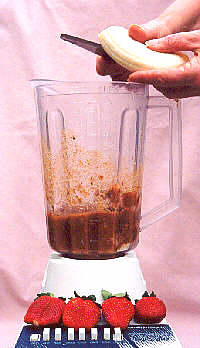
 Preparing the flax:
Nothing could be easier. You simply take one cup of flaxseeds,
place in a small Tupperware or Rubbermaid container, cover with 4 cups of
water and let sit overnight. What you end up with is a "flax gel" that
can easily be scooped and added to your favorite blender drinks. Simply
add two tablespoons of "flax gel" into a blender. Next, add the fruit(s)
of your choice, a tablespoon of whole raw honey for a tasty enzyme-rich
flavor and a cup of water. Soaking the flaxseeds not only allows for
a smoother consistency for smoothies, but it also assists in a more
thorough breakdown of the seed into all of its health-giving components
-- essentially predigesting the flax for you. You can also substitute
"flax gel" instead of egg whites in any of your favorite recipes.
The whole flaxseed is also a well-renowned colon cleanser when taken
on an empty stomach first thing in the morning and right before bedtime.
Simply add two tablespoons of raw flaxseeds and one cup of water
into a blender and blend for one minute. Drink immediately. Preparing the flax:
Nothing could be easier. You simply take one cup of flaxseeds,
place in a small Tupperware or Rubbermaid container, cover with 4 cups of
water and let sit overnight. What you end up with is a "flax gel" that
can easily be scooped and added to your favorite blender drinks. Simply
add two tablespoons of "flax gel" into a blender. Next, add the fruit(s)
of your choice, a tablespoon of whole raw honey for a tasty enzyme-rich
flavor and a cup of water. Soaking the flaxseeds not only allows for
a smoother consistency for smoothies, but it also assists in a more
thorough breakdown of the seed into all of its health-giving components
-- essentially predigesting the flax for you. You can also substitute
"flax gel" instead of egg whites in any of your favorite recipes.
The whole flaxseed is also a well-renowned colon cleanser when taken
on an empty stomach first thing in the morning and right before bedtime.
Simply add two tablespoons of raw flaxseeds and one cup of water
into a blender and blend for one minute. Drink immediately.
 The Right "Dosage":
Most books advocate taking 1 Tablespoon (15 ml.) of flax oil per day per
100 pounds (45 kg. or 7 stones) of body weight. So a 200 pound man would ideally
consume 2 Tablespoons (30 ml.) per day of flax oil. Since the
flax seed itself is about 41% flax oil, the math is easy:
consume 2.5 Tablespoons of flax per day per 100 pounds of
body weight. The Right "Dosage":
Most books advocate taking 1 Tablespoon (15 ml.) of flax oil per day per
100 pounds (45 kg. or 7 stones) of body weight. So a 200 pound man would ideally
consume 2 Tablespoons (30 ml.) per day of flax oil. Since the
flax seed itself is about 41% flax oil, the math is easy:
consume 2.5 Tablespoons of flax per day per 100 pounds of
body weight.
 If you soak your
flax overnight first, you will probably need to double this to accommodate
the expansion due to the absorption by the flax of the
surrounding water. If you soak your
flax overnight first, you will probably need to double this to accommodate
the expansion due to the absorption by the flax of the
surrounding water.
 Regardless, if you have any
problems following these instructions, just
contact our staff. Regardless, if you have any
problems following these instructions, just
contact our staff.
|
 Despite the age of the source material, not to mention portions that
delve into the metaphysics (the book contains three lectures, with the
last two dealing with flax as an intermediator in providing
man his necessary intake of solar energy), this bestseller
continues to inspire converts to the underlying science.
Some readers, (including this author), have described their initial
introduction as something of an epithany - and they claim to
have forever altered the way they eat. It goes without saying
that flax is part of their daily dietary regimen.
We definitely recommend a thorough reading - even if you find
certain parts a bit hard to swallow. (English edition, 1994,
p. 59; available at Amazon.com)
Despite the age of the source material, not to mention portions that
delve into the metaphysics (the book contains three lectures, with the
last two dealing with flax as an intermediator in providing
man his necessary intake of solar energy), this bestseller
continues to inspire converts to the underlying science.
Some readers, (including this author), have described their initial
introduction as something of an epithany - and they claim to
have forever altered the way they eat. It goes without saying
that flax is part of their daily dietary regimen.
We definitely recommend a thorough reading - even if you find
certain parts a bit hard to swallow. (English edition, 1994,
p. 59; available at Amazon.com)
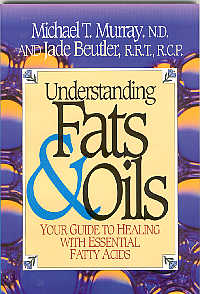
 It's all in the title, ... Your
Guide to Healing With Essential Fatty Acids.
If you really wish to understand
the underlying biochemistry and physiology and you only have time for
one book, get this one (available at amazon.com).
Describes in detail WHY saturated fats are "bad" and essential
fatty acids are "good." Covers the benefits of the right fats in the
diet for cancer, multiple sclerosis, allergies and inflammatory
conditions, as well as cardiovascular conditions. Some of the
early chapters are a bit onerous if you are weak in the life
sciences. Skip the parts that you don't understand, but by all
means, GET the central message. It could save your life. It's all in the title, ... Your
Guide to Healing With Essential Fatty Acids.
If you really wish to understand
the underlying biochemistry and physiology and you only have time for
one book, get this one (available at amazon.com).
Describes in detail WHY saturated fats are "bad" and essential
fatty acids are "good." Covers the benefits of the right fats in the
diet for cancer, multiple sclerosis, allergies and inflammatory
conditions, as well as cardiovascular conditions. Some of the
early chapters are a bit onerous if you are weak in the life
sciences. Skip the parts that you don't understand, but by all
means, GET the central message. It could save your life.
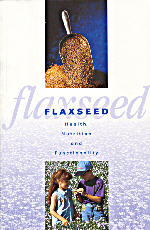
 This book is a more general monograph,
covering flax itself in depth. It covers all its components, makes comparisons
to other seed grains... Chapter 4 is of particular interest to our readers
because it covers flaxseed's use as a laxative, preventative in cancer
and cardiovascular diseases, and its role in aiding the immune system.
Although just 95 pages, the book is quite in-depth and draws upon
209 scientific studies and research sources. To obtain copies,
call the Flax Council of Canada at (204) 982-2115. Web site:
www.flaxcouncil.ca ... Email: flax@flaxcouncil.ca This book is a more general monograph,
covering flax itself in depth. It covers all its components, makes comparisons
to other seed grains... Chapter 4 is of particular interest to our readers
because it covers flaxseed's use as a laxative, preventative in cancer
and cardiovascular diseases, and its role in aiding the immune system.
Although just 95 pages, the book is quite in-depth and draws upon
209 scientific studies and research sources. To obtain copies,
call the Flax Council of Canada at (204) 982-2115. Web site:
www.flaxcouncil.ca ... Email: flax@flaxcouncil.ca
Other EFA Sources:
 Obviously, flax is not the only
source that will fix a deficiency of EFA's (essential fatty acids) in the
diet. It is, however, our choice. Other useful sources include:
evening primrose oil, black currant seed oil, borage oil, and
fish oil ("MAX EPA"). Obviously, flax is not the only
source that will fix a deficiency of EFA's (essential fatty acids) in the
diet. It is, however, our choice. Other useful sources include:
evening primrose oil, black currant seed oil, borage oil, and
fish oil ("MAX EPA").
|
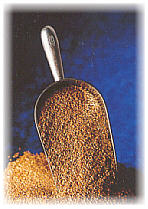 "If we
were to reduce the many
and varied forms of cancer to a common denominator, we would then
have to say that the living body lacks the ability to assimilate fat..."
H.V. Euler, Nobel Laureate
"If we
were to reduce the many
and varied forms of cancer to a common denominator, we would then
have to say that the living body lacks the ability to assimilate fat..."
H.V. Euler, Nobel Laureate
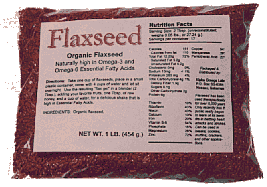 Is there is a coincidence behind the explosion
in arthritis, cancer, heart disease and other degenerative disorders
and the increased dietary use of hydrogenated and other saturated fats --
at the expensive of natural, unsaturated fats in the diet?
Is there is a coincidence behind the explosion
in arthritis, cancer, heart disease and other degenerative disorders
and the increased dietary use of hydrogenated and other saturated fats --
at the expensive of natural, unsaturated fats in the diet?



